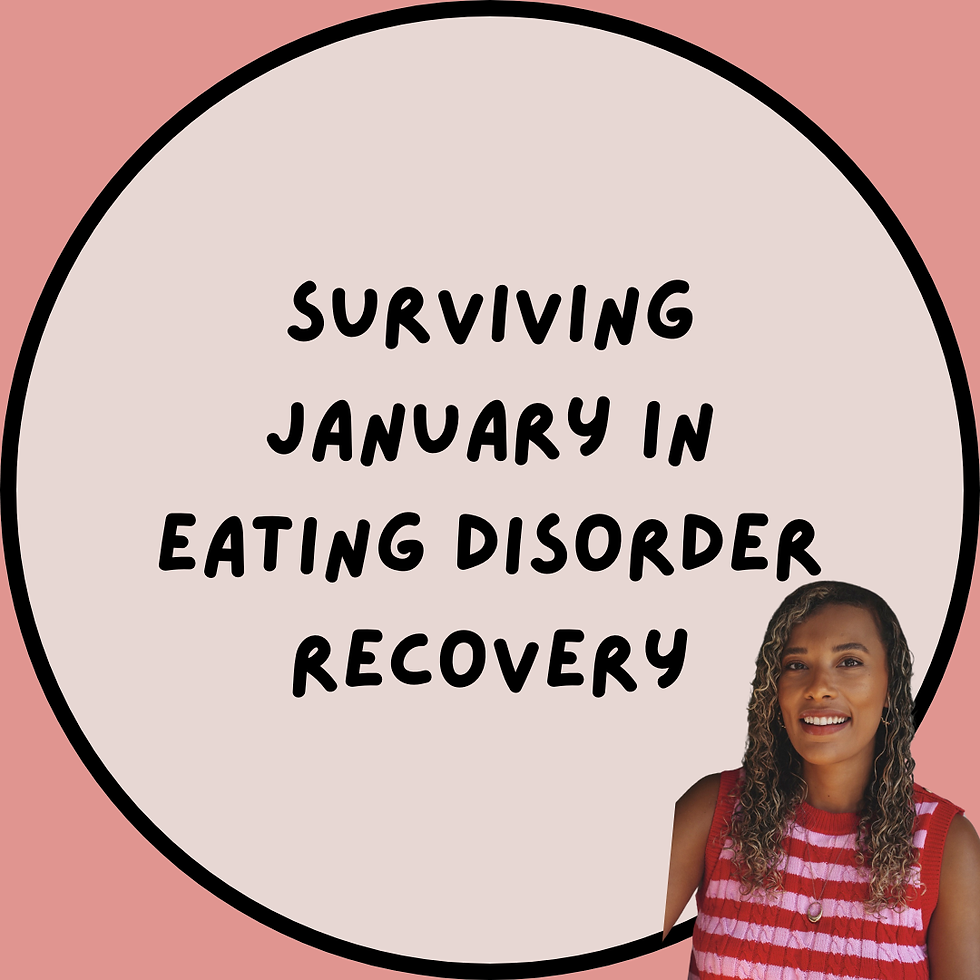Eating Disorder Signs, Symptoms & Myths
- Beth Francois

- Mar 3, 2025
- 3 min read
Updated: Jul 28, 2025
Eating disorders are complex mental health conditions, the consequences of which infiltrate all aspects of an individuals life. Despite common misconceptions, they are not just about food or weight but are deeply rooted in emotional and psychological struggles. Recognising the signs and symptoms early can be crucial in supporting someone on their recovery journey and the theme of this years EDAW is centred on increasing the knowledge and awareness of these signs.
I find it helpful to separate signs into physical, psychological and behavioural - these lists are not exhaustive and will differ from individual to individual.
Physical Signs | Psychological Signs | Behavioural Signs |
Low energy levels/fatigue Difficulty sleeping Dizziness/fainting Gastro symptoms (e.g. bloating, reflux, constipation) Amenorrhoea (loss of periods) Poor circulation Feeling cold easily Poor wound healing Hair loss, brittle nails Bladder incontinence Swollen parotid glands Dental erosion Changes in weight Lanugo (growth of fine, downy hair on body) Loss of bone density Deranged electrolytes Poor immune function | Intense fear of weight gain Preoccupation with body shape/weight Low self-esteem High levels of guilt & anxiety Distorted perception of body Rigid thinking patterns Depression & apathy Poor concentration Obsessive thinking about food Perfectionism Intolerance to spontaneity Impulsive decision making Dissociation & disconnection from body Irrational fears around certain foods Excessive self-criticism | Obsessive calorie counting Eating quickly/slowly Avoidance eating with others Frequent self-weighing Social isolation Wearing baggy clothing Disappearing during/after meals Talking about food excessively Reassurance seeking around weight Change in exercise routine Hoarding food Rigidity around eating Cutting out food groups Using specific crockery Struggling at school/work Ritualistic behaviours around eating |
Eating Disorder Myths
Myth: Eating disorders are all about food
Reality: whilst eating disorders manifest through eating behaviours, they are not simply food itself. They are serious mental health disorders influenced by psychological, genetic, and environmental factors. Issues such as low self-esteem, trauma, perfectionism, and anxiety often play a role in their development. Addressing only the food-related aspects without considering the underlying emotional and cognitive factors will not be adequate for sustained recovery. In the same way that alcoholism involves an addiction to alcohol, the factors leading to the addiction go far beyond the alcohol itself.
Myth: Eating disorders only affect white females
Reality: eating disorders do not discriminate. They affect people of all races, ethnicities, genders, and ages. Historically, research and media representation have focused primarily on white, young, middle-to-upper-class females, but evidence shows that eating disorders are prevalent in all communities. Marginalised groups, including men, ethnic minorities, and individuals in the LGBTQ+ community, face greater barriers to diagnosis and treatment due to stigma and a lack of awareness.
Myth: Eating disorders are about vanity
Reality: eating disorders are not about wanting to look a certain way or born out of vanity or a way of seeking attention. They are complex mental health conditions often rooted in deep emotional struggles, trauma, and a need for control. The level of distress, anxiety, and guilt surrounding behaviours, illustrates that eating disorders are not simply about appearance but about coping with internal difficulties.
Myth: You have to be underweight to have an eating disorder
Reality: eating disorders can affect individuals at any body size. Certain eating disorder presentations are often overlooked because an individual may not appear underweight. This misconception prevents people from seeking help and receiving a proper diagnosis and adequate treatment. Physical health complications and psychological consequences from eating disorders can occur at any weight and research suggests a large majority of those with an eating disorder are in fact not underweight.
Myth: Eating disorders are a choice
Reality: no-one chooses to have an eating disorder. Factors such as genetics, brain chemistry, thinking styles, social influences, and past trauma can contribute to their development. The reluctance individuals may show in letting go of their eating disorder is coming from a place of having a lack of internal control over their behaviours and is deep-rooted in fear & not a conscious decision to remain unwell.
Recognising the signs and symptoms of eating disorders is an essential step in providing support to those struggling. It’s important that these conversations are approached with empathy and compassion and to gently encourage anyone you may be concerned about to seek help from a qualified professional. Recovery is absolutely possible, particularly with early intervention and the right support.
The Beat website is a fantastic resource for support if you are worried about yourself or someone you know.


_edited.png)



Comments